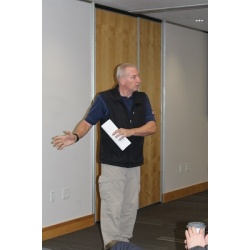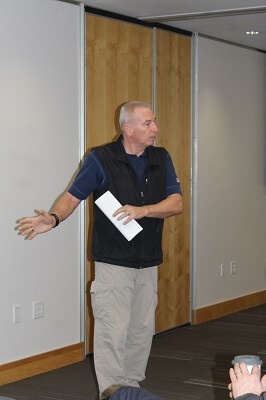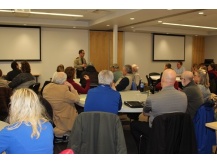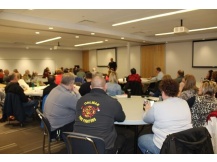
Emergency training workshop gives community members advice and tools to protect their work, place of business, church and schools
Winneshiek County Sheriff Dan Marx introduced Department of Homeland Security staffer Phil Pitzen at the Community Safety and Awareness Training held at NICC Wednesday morning that was attended by about 45 people from area businesses, churches, hospitals, schools, fire departments, police departments and sheriff departments.
Pitzen has worked at Homeland Security since shortly after 9/11. He has served as the Assistant Federal Security Director and most recently as a Protective Security Advisor assigned to Iowa. Pitzen has a Bachelor's Degree in criminal justice, as well as three advanced degrees, including a doctorate in justice administration.
Pitzen led training on responding to several types of emergencies including white powder incidents, bomb threats, suspicious packages and active shooter/armed intruder events.
Pitzen started out by praising the group, saying it was really proactive of them to have this seminar. He gave attendees tools and questions to take back to their place of business, church, and schools. "What are the vulnerabilities at my office or place of business?" Pitzen asked. He also encouraged everyone to have an emergency action plan and know what their role is in that plan.
Pitzen also performs security assessments across the US. "There are two rules for assessing security for any facility. The first rule is security equals inconvenience. If you want to make your site more secure, you are going to make it inconvenient for some people. While you work to make the site more secure, your own people may push back the most or undo what you have done," shared Pitzen. "If you decide to lock a back door, that has been unlocked in the past, employees may still unlock the door and neglect to relock it."
The second rule is placing an impediment between any given site and the general public. Schools across the nation now lock down their building after the first bell has rung. Any visitors must push a buzzer and be let in one at a time. Value has been placed on protecting the kids, even though it might be considered a hassle for some who enter the building.
Pitzen encouraged places such as gas stations to install a camera with a red eye outside the building at about six to seven feet on the wall by the door. "People tend to look up at the red light and that allows the camera to get a clear shot of each face," said Pitzen. "The goal is to not make it easy for a person meaning to do harm."
Site designed and maintained by Iroc Web Design Services©.
Your Small Business Web Design Solutions.™




